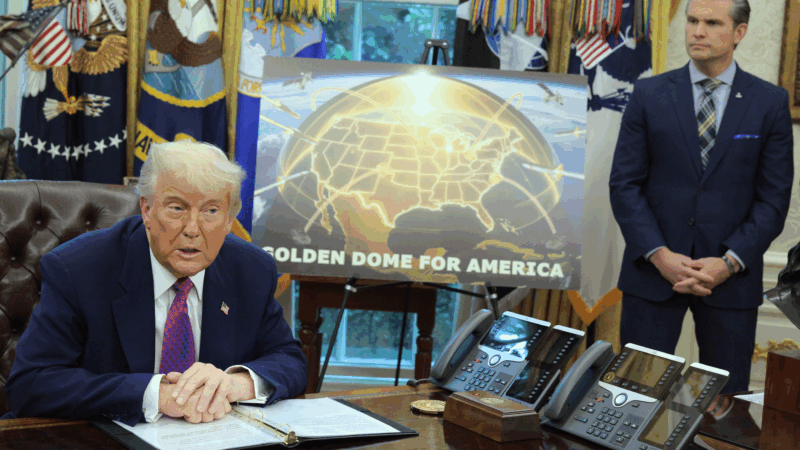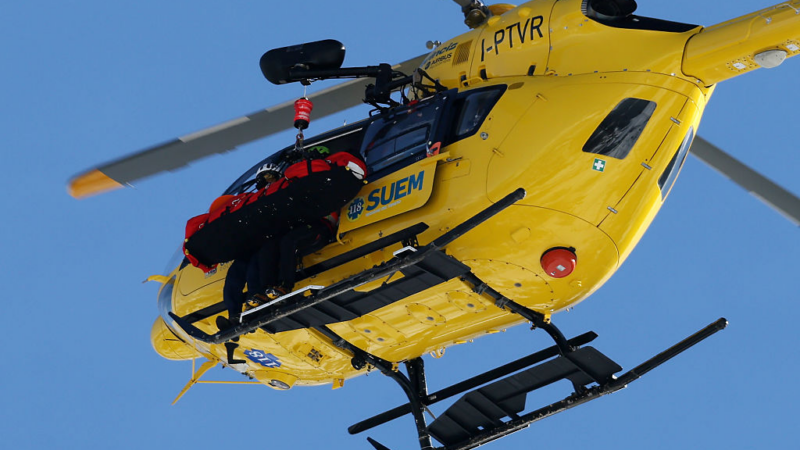Trump unveils ambitious and expensive plans for ‘Golden Dome’ missile defense
President Trump on Tuesday unveiled an ambitious plan to shield America from missile attack by building what he describes as a “Golden Dome.”
“Once fully constructed the Golden Dome will be capable of intercepting missiles even if they are launched from other sides of the world and even if they are launched from space,” Trump told reporters in the Oval Office.
Trump’s budget and timeline for the project are ambitious. He told reporters he hoped to have it done “before the end of my term.” The system would cost around $175 billion, the president said, with $25 billion to start construction in next year’s budget.
A key part of the Trump plan is to place both missile-sensing and missile-destroying satellites into orbit above the Earth. The constellation would likely involve thousands of small satellites capable of attacking a missile in the moments after it launches from its submarine or silo.
Such a vast network of satellites would have been unthinkable just a few years ago, but it now seems at least theoretically within reach. Elon Musk’s company SpaceX has been using low-cost rockets to launch a constellation of internet-transmitting satellites known as Starlink. SpaceX says the Starlink system currently has around 7,000 satellites in orbit, a scale that is comparable to most estimates of what a limited space-based missile defense capability would require.
“The overall Golden Dome effort is long overdue,” says Tom Karako, director of the missile defense project at the Center for Strategic and International Studies. Karako concedes that space-based interception of incoming missiles is a “wicked hard problem,” but he says the reality is that the next large war will likely be fought partially above Earth’s atmosphere. Given that reality, he thinks Golden Dome’s capabilities will provide the U.S. with a robust defense that could also be used for anti-satellite warfare if needed.
“There’s a need to contend with a whole lot of things that are in space and going through space,” he says.
Space-based missile defense has been a dream of politicians for decades. In 1983, Ronald Reagan announced plans for a system to intercept missiles from the then-Soviet Union.
“I know this is a formidable task, one that may not be accomplished before the end of this century,” Reagan said at the time. “It will take years, probably decades of effort on many fronts.”
In the end, the Soviet Union collapsed before anything approaching Reagan’s vision could be realized, but missile defenses have progressed. U.S. Patriot missiles have worked for decades to intercept shorter-range missiles, and the U.S. now has several systems capable of intercepting medium- and intermediate-range ballistic missiles. It also has a small number of interceptors capable of hitting ICBMs during the middle of their flight. That capability is aimed squarely at nuclear upstart North Korea.
Other countries, namely Israel and Ukraine, have used missile defenses to protect themselves from attack in recent years.

But intercepting Intercontinental Ballistic Missiles in large numbers remains a far more difficult problem. ICBMs launch from deep inside enemy territory and scream back to Earth at hypersonic speeds, making them nearly impossible to hit at the end of their flight. They can also deploy decoys that can fool interceptors. The best time to hit them is as they’re just launching from their silos, but doing so requires an extremely quick response by space-based interceptors. Thousands of interceptors must be launched in order to ensure that one is passing above a missile when it launches.
Whether the technology has, in fact, arrived is far from clear.
An orbital system would be complex, costly and ultimately vulnerable to counterattack, warns Laura Grego, a physicist at the Union of Concerned Scientists, a group skeptical of missile defense development. Grego says that a network like Golden Dome could be defeated by clustering launches to overwhelm the system, or by attacking the satellites themselves. The U.S. has recently accused Russia of studying how to place nuclear warheads in orbit. Such a warhead could knock out large sections of any Golden Dome system in space.
And the threats facing the U.S. are more diverse than ever. A recent report from the Defense Intelligence Agency showed that Golden Dome would also have to contend with new and emerging threats like cruise missiles, hypersonic missiles that can skim the edge of space and weapons known as Fractional Orbital Bombardment Systems, which can launch, glide through part of an orbit around the Earth and then attack from any direction.
The overall price of Golden Dome is far from certain. While the president says it could be done for $175 billion over three years, a recent estimate from the Congressional Budget Office put the cost at between $161-$542 billion over two decades. Separately, Sen. Tim Sheehy, R-Mont., who is heading a “Golden Dome caucus,” recently told a crowd that, “It will likely cost in the trillions if and when Golden Dome is completed,” according to Space News.
Given the potential high costs, Grego hopes that Congress will take a careful look before giving the Trump administration money to pursue the system. The road to missile defense “is littered with programs that were started and abandoned after some number of years,” Grego says. “I would say ask the hard questions at the beginning, before you go down this road.”
The FDA creates a quicker path for gene therapies
The Food and Drug Administration aims to evaluate treatments for rare diseases based on plausible evidence that they would work — without requiring a clinical trial first.
BAFTAs apologize after guest with Tourette syndrome uses racial slur during ceremony
A man with Tourette syndrome shouted a racial slur and other offensive remarks during the BAFTA awards ceremony Sunday. The BBC did not edit out his outbursts in its delayed broadcast.
‘Everything was in pieces:’ Lindsey Vonn describes grueling surgery on broken leg
In a recent video, the Olympic skier credits her surgeon with saving her leg from potential amputation.
A new lawsuit alleges DHS illegally tracked and intimidated observers
Observers watching federal immigration enforcement in Maine who were told by agents they were "domestic terrorists" and would be added to a "database" or "watchlist" are now part of a new federal class action lawsuit.
Kate Hudson on regret, rom-coms and finding a role that hits all the notes
Hudson always wanted to sing, but feared it would derail her acting career. Now she's up for an Oscar for her portrayal of a hairdresser who performs in a Neil Diamond tribute band in Song Sung Blue.
A powerful winter storm is roiling travel across the northeastern U.S.
Forecasters called travel conditions "extremely treacherous" and "nearly impossible" in areas hit hardest by the storm, and air and train traffic is at a standstill in many parts of the region.








